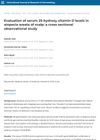 October 2021 in “International Journal of Research in Dermatology”
October 2021 in “International Journal of Research in Dermatology” People with alopecia areata often have low vitamin D levels, which may worsen their hair loss.
 December 2021 in “Benha Journal of Applied Sciences”
December 2021 in “Benha Journal of Applied Sciences” Higher Claudin 3 levels in the blood are linked to more severe alopecia areata.
 December 2023 in “JEADV Clinical Practice”
December 2023 in “JEADV Clinical Practice” A woman's hair grew back with baricitinib treatment, but she developed a temporary hairy tongue that was treated with regular tongue brushing.
 25 citations,
December 2015 in “Journal of the European Academy of Dermatology and Venereology”
25 citations,
December 2015 in “Journal of the European Academy of Dermatology and Venereology” Alopecia areata significantly lowers quality of life, especially in personal and social areas, and more so if the patient is also depressed.
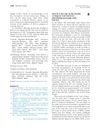 44 citations,
November 2016 in “Journal of The American Academy of Dermatology”
44 citations,
November 2016 in “Journal of The American Academy of Dermatology” The updated SALT II tool offers a more precise way to measure scalp hair loss.
 2 citations,
May 2022 in “JAAD Case Reports”
2 citations,
May 2022 in “JAAD Case Reports” A woman lost all her hair after mild COVID-19, but it started to regrow after treatment with a specific medication.
 2 citations,
August 2022 in “JAAD case reports”
2 citations,
August 2022 in “JAAD case reports” COVID-19 vaccines may rarely worsen hair loss in people with severe alopecia, but the benefits of vaccination still outweigh this risk.

Reducing the dose of Baricitinib to 2mg still helped over half of the patients with severe scalp alopecia maintain their hair regrowth after two years.
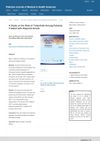 December 2022 in “Pakistan Journal of Medical and Health Sciences”
December 2022 in “Pakistan Journal of Medical and Health Sciences” Tofacitinib effectively treats Alopecia Areata.
 9 citations,
October 2021 in “International Journal of Dermatology”
9 citations,
October 2021 in “International Journal of Dermatology” Tofacitinib is effective and safe for treating severe hair loss in a Saudi population.
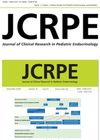 December 2024 in “Journal of Clinical Research in Pediatric Endocrinology”
December 2024 in “Journal of Clinical Research in Pediatric Endocrinology” 21-hydroxylase deficiency causes hormone imbalances leading to various symptoms, and diagnosis involves clinical and genetic tests.
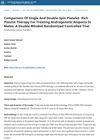 January 2025 in “Journal of Bacha Khan Medical College.”
January 2025 in “Journal of Bacha Khan Medical College.” Double-spin PRP is more effective for treating male pattern baldness.
43 citations,
November 2009 in “Archives of dermatology” Alefacept does not effectively treat severe alopecia areata.
 June 2017 in “Journal of the American Academy of Dermatology”
June 2017 in “Journal of the American Academy of Dermatology” Tofacitinib is effective and safe for treating severe alopecia areata and related conditions.
 April 2022 in “Research Square (Research Square)”
April 2022 in “Research Square (Research Square)” The combination of laser and topical steroids is more effective for treating alopecia areata than topical steroids alone.
 130 citations,
February 2018 in “Journal of Investigative Dermatology”
130 citations,
February 2018 in “Journal of Investigative Dermatology” Tofacitinib may help treat severe hair loss, but more research is needed.
 April 2019 in “The journal of investigative dermatology/Journal of investigative dermatology”
April 2019 in “The journal of investigative dermatology/Journal of investigative dermatology” Machine learning can predict how well patients with alopecia areata will respond to certain treatments.
April 2017 in “Leukemia research” Tofacitinib helped most teenagers in the study regrow hair with mild side effects.
 May 2024 in “International Journal of Cosmetic Science”
May 2024 in “International Journal of Cosmetic Science” Disulfide bonds are crucial for hair's strength, especially when wet.
 4 citations,
January 2024 in “JEADV. Journal of the European Academy of Dermatology and Venereology/Journal of the European Academy of Dermatology and Venereology”
4 citations,
January 2024 in “JEADV. Journal of the European Academy of Dermatology and Venereology/Journal of the European Academy of Dermatology and Venereology” Baricitinib and ritlecitinib are recommended for severe alopecia areata, with other treatments available off-label.
 May 2024 in “Journal of cosmetic dermatology”
May 2024 in “Journal of cosmetic dermatology” Tofacitinib is an effective and safe treatment for alopecia areata.
 February 2011 in “Annales de dermatologie et de vénéréologie”
February 2011 in “Annales de dermatologie et de vénéréologie” Tofacitinib shows promise for treating severe alopecia areata with good safety and effectiveness.

Liquid nitrogen cryotherapy is an effective treatment for alopecia areata.
 2 citations,
January 2023 in “Dermatology Practical & Conceptual”
2 citations,
January 2023 in “Dermatology Practical & Conceptual” AB+ blood group is more common in alopecia areata patients.
 12 citations,
January 2016 in “Journal of Clinical and Investigative Dermatology”
12 citations,
January 2016 in “Journal of Clinical and Investigative Dermatology” Low vitamin D levels are common in people with Alopecia Areata.
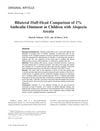 24 citations,
January 2017 in “Pediatric dermatology”
24 citations,
January 2017 in “Pediatric dermatology” 1% anthralin ointment is effective and safe for treating severe alopecia areata in children.
Testosterone raises blood pressure by affecting kidney function and brain gene regulation over time.
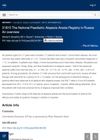 September 2022 in “Journal of the American Academy of Dermatology”
September 2022 in “Journal of the American Academy of Dermatology” The registry showed that tofacitinib is promising for treating hair loss in children with alopecia areata, but more research is needed.
 9 citations,
June 2019 in “Archives of Dermatological Research”
9 citations,
June 2019 in “Archives of Dermatological Research” Both topical calcipotriol and narrowband UVB improved alopecia, but combining them didn't enhance the effect on hair loss severity, despite higher vitamin D3 levels.
2 citations,
March 2022 in “Dermatologic Therapy” Latanoprost 0.005% solution safely increases hair density and regrowth in scalp alopecia areata.


























